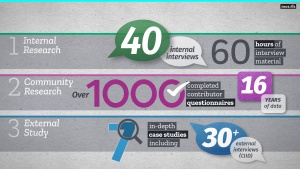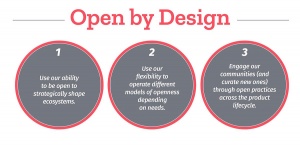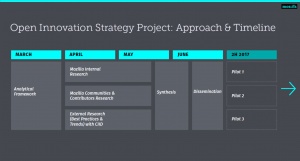Innovation/Projects/Open Innovation Strategy
MoCo Open Innovation Strategy Project
“Openness” defines Mozilla more than any other characteristic, in both the products and technologies the organisation builds and in how it operates.
In 2017, the Open Innovation team conducted a research project to help Mozilla (MoCo) revitalize participation and broader external engagement to be a source of competitive advantage for its products and technologies. The project analysed how effective Mozilla is in its open practices across both staff and contributor communities as well as how other industry actors use openness for competitive advantage. Based upon these findings, the project made recommendations for how MoCo can better invest in and execute on being “open.”
Although the project was focused on developing products and technologies (typically the focus of Mozilla Corp, MoCo), it was conducted in collaboration with the Mozilla Foundation.
Methodology
In order to begin from an evidence-based, shared understanding of the problem, the project researched three perspectives:
Internal Research
We documented internal perspectives on open source and external collaboration at Mozilla by interviewing numerous employees, particularly those working most directly with contributors.
Communities and Contributors Research
This component analyzed Mozilla communities and contributors to understand who they are, how and what they engage with, their motivations, and how they’re connected to one another as well as to other open source and open Web projects. This was done through a survey of over 1000 community members and an analysis of 16 years of contribution data (Bugzilla, GitHub, and more), which was driven by Bitergia.
External Research
In partnership with the Copenhagen Institute of Design, (CIID), we conducted case studies of seven organizations for inspiration and lessons. Target organizations were Sage Bionetworks, 23andme, Arduino, Aleph Objects, Automattic, NASA, and Kubernetes. They were chosen because they varied in market sector and met selective criteria such as being mission-focused, reliant upon external participation in ways fundamental to strategy and product, and supported by vital, growing communities.
Past Research
The project was also informed by related research, such as the D&I study, historical community research, and current Open Source Experiments.
This was the first time Mozilla undertook such a comprehensive analysis of its community efforts, and we expect to revisit the communities and contributors research annually.
Also, note that although the project was focused on MoCo, it was run in coordination with MoFo.
Results
Internal Research
Interviews covered opportunities and challenges with external community engagement as well as day-to-day management of relationships and communities. Mozilla employees firmly believe in 'open' as a core Mozilla value and that ‘working open’ can provide benefit to the organisation; however, they described many challenges to working more effectively with participants and communities. A summary of these challenges is that Mozilla has generally not kept up with market developments and opportunities around open, collaborative methods, nor has it consistently and strategically invested in participation and collaboration.
Communities and Contributors Research
Mozilla’s position with community and participation is stronger than perhaps believed. While some areas of contribution have experienced recent difficulties – SUMO and Web Compatibility both report challenges with tools and processes – the data on actual code contribution is solid. The organization has a very visible industry profile, attracting thousands of global code authors every year (almost 2,400 new code authors in 2017 alone), which is notable relative to other mature FOSS projects. Non-employee contribution to Firefox and Gecko has grown and appears reasonably stable, and the communities around Emerging Technologies projects are growing. In addition, the data show that Mozilla is quicker than other open source projects to respond and act on pull requests.
Mozilla has strived to make its operational processes transparent and to provide engagement opportunities beyond open source co-development. Although there's room for improvement, Mozilla community participation seems well distributed across coding and non-coding projects. The qualitative survey found participation focused around events, localization, marketing, and teaching, as well as coding, with most participation occurring later in the product lifecycle. This points to an opportunity to work more effectively with our communities earlier in the product lifecycle. Mozilla certainly needs to work on gender diversity in its communities, but the age and geographical distribution was better than expected.
Other key community research findings include:
- Mozilla often perceives its large group of volunteers as ‘the Mozilla community’ -- as an entity somehow definably singular. However, the research showed that there is not one singular Mozilla community, but many. Differences are related not only to project focus and personal interest but also to motivations, operational norms, social capital and density, feelings of affiliation, and more. Understanding the differences and the reasons behind them is foundational to improving engagement, retention, and collaboration opportunities of mutual benefit.
- There are clear gaps in Mozilla’s collective knowledge about its community activities and health. The Open Innovation team is already addressing these areas for improvement.
- There are likely interesting opportunities for Mozilla to build stronger alliances for the open web through the broader open source networks of Mozilla contributors. The research identified that the 1,000 Mozilla contributors who made at least 5 commits in Mozilla projects over the past 3 years also participated in more than 35,000 non-Mozilla GitHub repositories between 2010 and 2016 (as defined by pull requests).
External Research
The case studies presented a rich set of findings, despite different products, markets, and organizational size. They also presented common themes in their approach to participation and external engagement.
The Open Innovation team has been posting summaries of the external research on our Open Innovation blog. We encourage you to follow the blog for more details on this aspect of the project.
Recommendations
The research made clear that while Mozilla's baseline is open, if the desired effects of this openness are unclear, the organisation's actions are prone to be unfocused and weak in impact. In order to be open effectively, Mozilla needs to be more deliberate about what it's aiming to accomplish and to design for that effect: Mozilla needs to be open by design.
Open by design builds on the open nature and participatory culture that is core to Mozilla. Amplifying the organisation's ‘openness’ (code, culture, workflows, communities), open by design means being more intentional in how Mozilla builds communities and external engagements in order to achieve a desired market impact and, ultimately, a collective vision for the open web.
There are several long-term recommendations for how Mozilla can be open by design. These recommendations will help Mozilla improve its position in key areas of competition and create attractive communities that provide the most benefit possible to participants (see image). They will also help Mozilla find a new, shared sense of the value of community and participation. Note that the recommendations' implications differ across Mozilla. For example, the Firefox and Emerging Technologies organizations operate under different conditions, with different areas of opportunity for open by design.
Implementation of Open by Design Recommendations
Mozilla began implementing these recommendations through several prototype projects in 2H 2017. The organisation is identifying additional projects as part of 2018 planning, and we'll work in other ways to better align our structure, processes, people, and incentives to support open by design.
In addition to these project-focused, 'teaching by doing' collaborations, the Open Innovation team is acting on some of the foundational items required to support an open by design organisation:
- Our Service Design team is working to improve the contributor experience in Mozilla’s open source and open innovation programs.
- We have implemented Bitergia’s GrimoireLab to provide community analytics at Mozilla, and we're collaborating with other open source projects to identify best practices in contribution metrics. In addition, we're creating a Community Support Software Product (CoSS) to lay the systems foundation to ensure Mozilla has broad access to the community data we need to make sound programmatic decisions.
- We're creating a set of guidelines for tools used in community work -- in particular, how to use closed tools in an open process. We recognize the inherent conflict, and we also recognize that many may feel it's an impossible conflict to resolve. Nonetheless, until there are enough open source tools that meet the specific needs of Mozilla's various projects, it's a conflict we'll have to manage. Open Innovation is working to minimize one aspect of this problem with a unified access management system (project IAM), which will allow all Mozillians (employees and contributors) to access Mozilla services through a unified, authoritative, and integrated identity system.
- In collaboration with Mozilla's Diversity & Inclusion team, we've created a process for handling community behavior complaints.
- We're reaching out to new sources of experts and advocates through the Open Source Student Network.
- The Open Innovation team is also considering how to better approach the subset of Mozilla communities that have similar skillsets, goals, and needs. Although there are indeed many communities at Mozilla, there are enough similarities across this particular 'generalist group' that a more integrated, common interface and approach is merited.
Team
The project’s Steering Committee provided oversight and included:
- Katharina Borchert • Chief Innovation Officer
- Patrick Finch • Director, Open Innovation
- John Jensen • Director, Organization Strategy
- David Herman • Director of Strategy, Emerging Technologies
- Nick Nguyen • VP, Firefox
- George Roter • Director, Open Innovation
The project’s Core Team members drove the project and included:
- Patrick Finch • Responsible
- Susy Struble • Strategic advisor & Internal research
- Pierros Papadeas • Open source expert
- Rina Tambo Jensen • Lead researcher
- Ruben Martin • Communities and contributors research
- Alex Klepel • Internal communications
- David B. Schwartz (Princeton) • Researcher
The project's External Partners helped with some aspects of the research:
Timeline and Status
The project launched in March 2017 and concluded in November 2017.
- March: Finalized analytical framework
- April - May: Conducted internal interviews, community survey and research, & external research; communicated about project to Mozilla community members and employees
- May: Synthesized findings & more internal communication
- June: Presented project findings and recommendations to Mozilla executives
- July: Recommendations signed off by Mozilla executives; pilot projects began for 2H 2017
- October: Communicated survey results to the Mozilla community
- November: Internal alignment on open by design as part of 2018 planning
- November - the future: Implement open by design recommendations
As of November 2017, the Open Innovation Strategy project is complete, and we will not continue updating this wiki entry. Our attention turns now to implementation.
We expect to run the communities and contributors research on an annual basis. We will share select findings from this research on Discourse and likely on the Open Innovation blog as well.
If you want to learn more about the project or have thoughts, suggestions, relevant research, or would like to directly participate in future research, please email the Open Innovation Team.
Our deepest gratitude goes to all the Mozilla community members who helped on this project and who continue to donate their time, insight, and efforts to supporting the open web!



